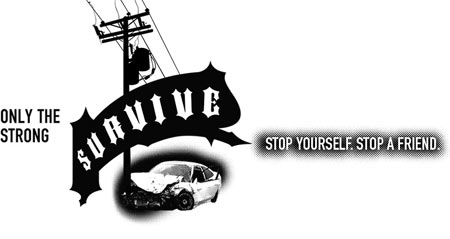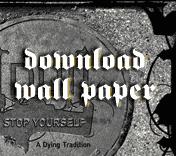
Resources
Teens > Resources >
Bibliography
- Anthony, J.C. and K.R. Petronis. “Early onset drug use and risk
of later drug problems.” Drug and Alcohol Dependence,
40:9�15.
- Blincoe, L., A. Seay, E. Zaloshnja, T. Miller, E. Romano, S. Luchter,
et al. “The economic impact of motor vehicle crashes, 2000.”
Washington, D.C.: U.S. Department of Transportation, National Highway
Traffic Safety Administration (NHTSA), 2002. http://www.nhtsa.dot.gov.
- Brook, J.S., P. Cohen, and D.W. Brook. “Longitudinal study of
co-occurring psychiatric disorders and substance use.” Journal
of the American Academy of Child and Adolescent Psychiatry 37(3):322�330,
1998.
- Brook, J.S., Z. Rosen, and D.W. Brook. “The effect of early
marijuana use on later anxiety and depressive symptoms.” NYS
Psychologist 35�39, January 2001.
- California Office of Traffic Safety. Annual Report of Fatal and
Injury Motor Vehicle Traffic Collisions, 2005.
- Center for Disease Control and Prevention. “Fact Sheet: Impaired
Driving.” www.cdc.gov/ncipc/factsheets/drving.htm
(accessed Dec. 1, 2007).
- Chudler, Eric H. Neuroscience for Kids. http://faculty.washington.edu/chudler/alco.html
(accessed Dec. 1, 2007).
- Diana, M., M. Melis, A.L. Muntoni, and A.G. Gessa. “Mesolimbic
dopaminergic decline after cannabinoid withdrawal.” Proceedings
of the National Academy of Sciences of the United States of America
95 (17):10,269�10,273.
- Drug Abuse Warning Network. Drug Abuse Warning Network, 2003:
Area Profiles of Drug-Related Mortality. Substance Abuse Mental
Health Services Administration: 2003.
- Drug Abuse Warning Network. Drug Abuse Warning Network, 2005:
National Estimates of Drug-Related Emergency Department Visits.
DAWN Series D-29, DHHS Publication No. (SMA) 07-4256, Rockville, MD,
March 2007. http://dawninfo.samhsa.gov (accessed Dec. 1, 2007).
- Grant, B.F. and D.A. Dawson. “Age of onset of drug use and its
association with DSM-IV drug abuse and dependence: Results from the
National Longitudinal Alcohol Epidemiologic Survey.” Journal
of Substance Abuse 10:163�173.
- Green, B.E. and C. Ritter. “Marijuana use and depression.”
Journal of Health and Social Behavior 41(1):40�49.
- Greenblat, J. “Self-reported behaviors and their association
with marijuana use.” Based on data from the National Household
Survey on Drug Abuse, Substance Abuse and Mental Health Services Administration:
1994�1996, 1998.
- Grunbaum, J., Kann, L., Kinchen, S., Ross, J., Hawkins, J., Lowry,
R., Harris, W., McManus., T., Chyen, D., and J. Collins. “Youth
Risk Behavior Survey, 2003.” Center for Disease Control and Prevention.
http://www.cdc.gov/mmwR/preview/mmwrhtml/ss5302a1.htm
(accessed October 2, 2007).
- Hingson, R., T. Heeren, M. Winter, and H. Wechsler. “Magnitude
of alcohol-related mortality and morbidity among U.S. college students
ages 18�24: Changes from 1998 to 2001,” Annual Review of Public
Health 26 (2005): 259�79.
- In the Know Zone. www.intheknowzone.com
(accessed October 1, 2007).
- Johnston, L.D., P.M. O�Malley, and J.F. Bacman. Monitoring the
Future: National Results on Adolescent Drug Use, Overview of Key Findings.
U.S. Department of Health and Human Services, National Institutes of
Health: 2003.
- National Highway Traffic Safety Administration. Drug-Impaired
Driving. http://www.nhtsa.dot.gov
(accessed October 28, 2007).
- National Highway Traffic Safety Administration. “National Survey
of Drinking and Driving Attitudes and Behaviors, 2001” www.nhtsa.dot.gov/people/injury/alcohol/traffic-tech2003/TT280.pdf
(accessed October 12, 2007).
- National Institute on Drug Abuse. “Marijuana: Facts Parents
Need to Know.” National Institutes of Health: Revised November
1998.
- National Institute on Drug Abuse. “NIDA Research Report: Inhalant
Abuse, 2005.” National Institutes of Health: 2005.
- Office of National Drug Control Policy. “Marijuana and Kids:
Steer Clear of Pot Fact Sheet.” www.mediacampaign.org/steerclear/factsheet.html#go17
(accessed December 1, 2007).
- Quinlan K.P., R.D. Brewer, P. Siegel, D.A. Sleet, A.H. Mokdad, R.A.
Shults, N. Flowers. “Alcohol-impaired driving among U.S. adults,
1993�2002,” American Journal of Preventive Medicine 28(4):345�350.
- Rodriguez de Fonseca, F. et al. “Activation of corticotrophin-releasing
factor in the limbic system during cannabinoid withdrawal.” Science
276(5321): 2,050�2,064.
- Snyder, H. Juvenile Arrests 2004. Bulletin. U.S. Department
of Justice, Office of Justice Programs, Office of Juvenile Justice and
Delinquency Prevention: 2006.
- Substance Abuse Mental Health Services Administration. Results
from the 2002 National Survey on Drug Use and Health: National Findings.
- Substance Abuse and Mental Health Services Administration. 2005
National Survey on Drug Use and Health.
- UC Berkeley Traffic Safety Center. Online Newsletter 1, no.
3 (Summer 2003); interview with Marilyn Sabin.
- U.S. Department of Justice. National Survey on Drug Use and Health.
2004.
- U.S. Department of Transportation, National Highway Traffic Safety
Administration (NHTSA). Traffic Safety Annual Assessment: Alcohol-Related
Fatalities. Washington, D.C.: NHTSA, 2006.
- U.S. Department of Transportation, National Highway Traffic Safety
Administration (NHTSA). Traffic Safety Facts 2003: Overview.
Washington, D.C.: NHTSA, 2004b. www-nrd.nhtsa.dot.gov/pdf/nrd-30/NCSA/TSF2003/809767.pdf
(accessed November 1, 2007).
- U.S. Department of Transportation, National Highway Traffic Safety
Administration (NHTSA). Traffic Safety Facts 2005: Alcohol.
Washington, D.C.: NHTSA, 2005. http://www-nrd.nhtsa.dot.gov/Pubs/810616.PDF
(accessed November 1, 2007).




